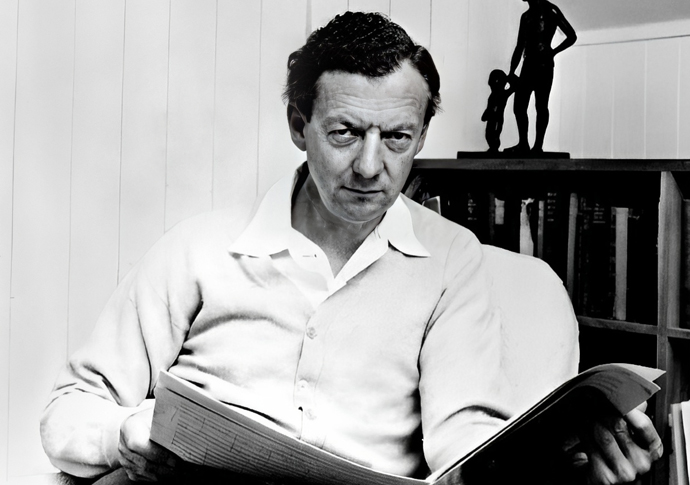Michael White’s classical news: Benjamin Britten; Bach; Stravinsky; Tasting Notes; The Duchess of Padua
Thursday, 15th February — By Michael White

Benjamin Britten [Hans Wild]
IT’S an open question whether Benjamin Britten – perhaps the greatest composer this country has ever produced – did or didn’t believe in God. But he wrote plenty of music you could call “religious”. And that he believed in something is clear from the sequence of pieces he wrote across the course of his life, called Canticles.
They address widely different subjects, from the Old Testament story of Abraham and Isaac to an idea of Christ re-crucified during the Second World War Blitz (imagined in poetry by Edith Sitwell) and a setting of mystical verse – “My beloved is mine and I am his” – that was as close as Britten could get in the 1940s to a public declaration of love for his partner Peter Pears.
But what binds them together is a spiritual intensity that holds you in its grip. And it will do so on Feb 22, when a choice group of musicians perform them all at Temple Church, off the Strand. Led by the dazzling tenor Allan Clayton and pianist Julius Drake, it has to be the event of the week. templemusic.org
• No less spiritually intense are the six timeless masterworks that are Bach’s unaccompanied Cello Suites. And star cellist Steven Isserlis explores them on Sunday evening, Feb 18, at JW3: the Jewish cultural centre in Finchley Road, NW3. He’s joined by Dame Janet Suzman reading extracts from his book about the Suites. And that afternoon he’ll lead public masterclasses with young players. Rather them than me (his sense of humour takes no prisoners). jw3.org.uk
• I don’t think Stravinsky was into birdwatching but he takes flight in two separate London venues, Feb 16, with works of ornithological fantasy. At the Festival Hall the London Philharmonic Orchestra perform his Firebird Suite (southbankcentre.co.uk), while at the Barbican the BBC Symphony Orchestra perform his Song of the Nightingale (barbican.org.uk). Pick your plumage.
• London’s classical circuit is so competitive that people go to strange lengths to fill their concerts; and an example hits St John’s Smith Square, Feb 16, with Tasting Notes – an initiative by the London Mozart Players that pairs music with wine. I can’t tell you what’s on the programme (serenades to Bacchus? Operatic drinking songs?) but alcohol will be served throughout. And I daresay it gets better as it goes on. sjss.org.uk
• Fringe opera openings this week include The Duchess of Padua: a new piece by composer Edward Lambert, based on a tale by Oscar Wilde and playing Feb 20 -25 at The Space, E14 (space.org.uk). There’s a staging of Verdi’s Macbeth, Feb 17 & 20, at St Mary’s Primrose Hill (tealeafoperaproductions.co.uk). The accomplished Ensemble OrQuesta have a Marriage of Figaro at the Cockpit, Marylebone, Feb 21-24 (ensembleorquesta.com). And though it’s not quite opera, Puccini’s Messa di Gloria is the next best thing – hence a performance by Opera Holland Park at Holy Trinity, Sloane Street, Feb 22. (operahollandpark.com)
• Finally, if you asked me who are the most promising young string quartet on the international circuit right now, I’d say the German-based Leonkoro Quartet – who happen to be at Wigmore Hall, Feb 19, playing Janáček and Schumann. A must-hear. wigmore-hall.org.uk